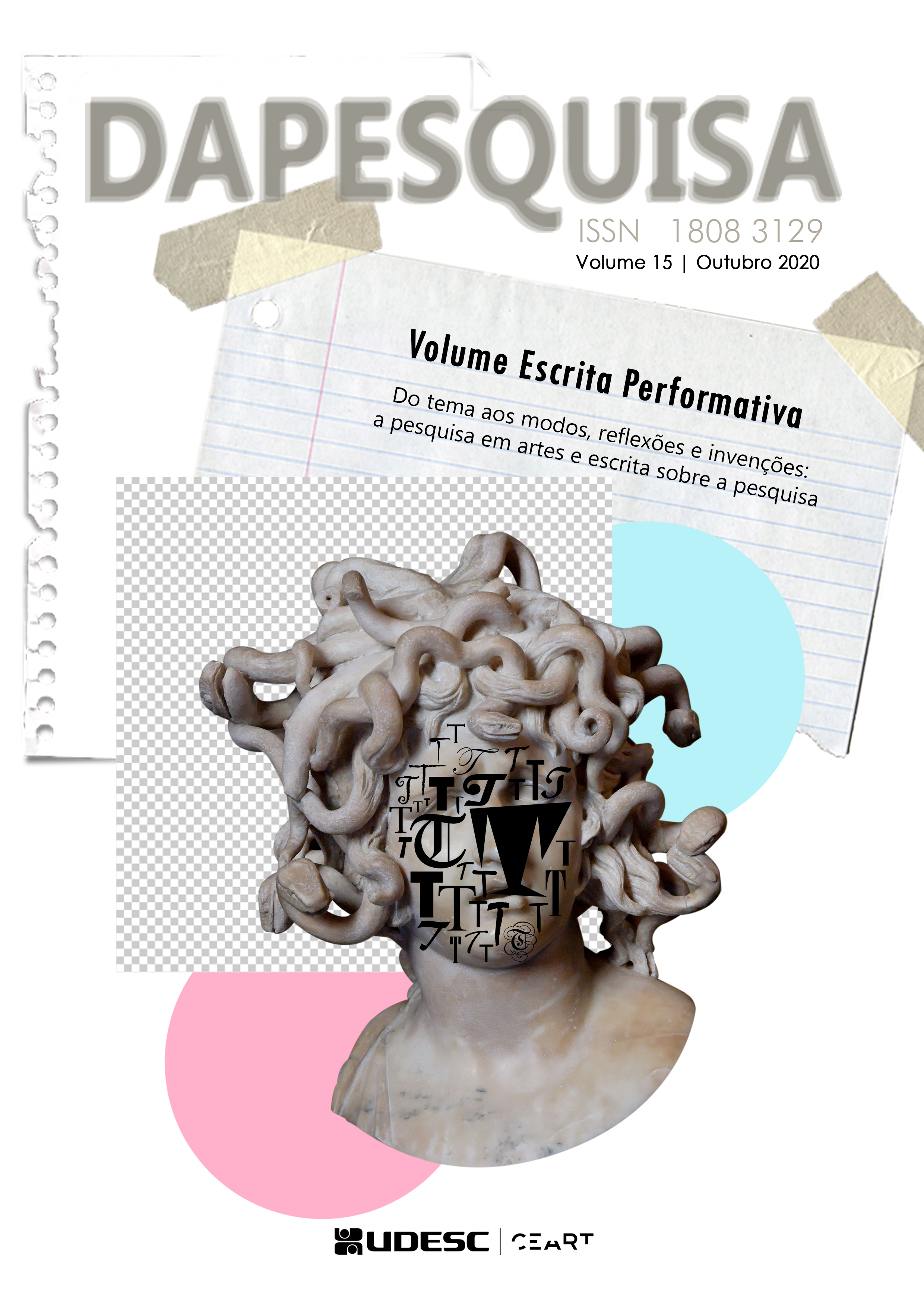Perfografia e escrita situada
caminhos para uma pesquisa em arte
DOI:
https://doi.org/10.5965/1808312915252020e0022Palavras-chave:
Cartografia na arte - Metodologia, Escrita e arte, Performatividade (Filosofia)Resumo
Duas escritas tecem este texto: a primeira é colorida, narra as fraquezas e as inseguranças do processo de escrita; a segunda é um artigo, nos moldes acadêmicos, que discorre sobre duas práticas de pesquisa em arte – a perfografia e a escrita situada a partir da relação com o Modo Operativo AND. Ambas têm a atitude cartográfica – o acompanhar dos processos e o acolhimento dos acontecimentos – como um princípio de ação.
Downloads
Referências
BAFFI, D. E. Destino: poesia – tentativas de fazer arte na condição de estrangeiro. Arte da Cena (Art on Stage), Goiânia, v. 2, n. 3, p. 203-218, jul./dez. 2016.DOI: https://doi.org/10.5216/ac.v2i3.44797. Disponível em: https://www.revistas.ufg.br/artce/article/vi ew/44797. Acesso em: 24 set. 2019.
CIOTTI, N. O professor-performer. Natal: EDUFRN, 2014.
CLARK, L. Livro-obra. In: BORJA-VILLEL, M. J. et al. Lygia Clark. Barcelona: Fundació Antoni Tàpies, 1998.
DELEUZE, G.; GUATTARI, F. Mil Platôs. Rio de janeiro : Editora 34, 1995. v.1
EUGÉNIO, F. Caixa-Livro AND. Rio de Janeiro: Fada Inflada, 2019.
EUGÉNIO, F.; FIADEIRO, J. Jogo das Perguntas: o modo operativo “AND” e o viver juntos sem ideias. Fractal: Revista de Psicologia, Niterói, v. 25, n. 2, p. 221-246, maio/ago. 2013. Disponível em: http://periodicos.uff.br/fractal/article/view/4940. Acesso em: 18 out. 2013.
FABIÃO, E. Performance e teatro: poéticas e políticas da cena contemporânea. Sala Preta, São Paulo, n. 8, p. 235-246, 2008. Disponível em: http://www.revistas.usp.br/salapreta/article/view/57373/60355. Acesso em 13 mar.2014.
FERNANDES, C. Entre Escrita Performativa e Performance Escritiva: o local da pesquisa em artes cênicas com encenação. In: CONGRESSO BRASILEIRO DE PESQUISA E PÓS-GRADUAÇÃO EM ARTES, 5., 2008, Belo Horizonte. Anais [...]. Belo Horizonte : ABRACE, 2008. Disponível em: https://www.publionline.iar.unicamp.br/index.php/abrace/article/view/1607 . Acesso em: 02 jul. 2020.
GREINER, C. O corpo: pistas para estudos indisciplinares. 2. ed. São Paulo: Annablume, 2006.
KASTRUP, V.; TEDESCO, S.; PASSOS, E. Políticas da Cognição. Porto Alegre: Sulina, 2008.
LICONTI, J. L. Pistas para uma poética dos acidentes. 2016. Dissertação. (Mestrado em Teatro). Programa de Pós-graduação em Teatro, Universidade do Estado de Santa Catarina, Florianópolis, 2019. Disponível em: http://sistemabu.udesc.br/pergamumweb/vinculos/000023/0000233e.pdf. Acesso em: 02 jul 2020.
KWON, M. One place after to another: site-specific art and locational identity. Massachusetts Institute of Technology, 2002.
MARQUES, D.; RACHEL, D. Perfografia. Redobra, Salvador, n. 11, p.152-161, abril. 2013. Disponível em: http://www.redobra.ufba.br/wp-content/uploads/2013/06/redobra11_17.pdf. Acesso em: 06 ago. 2019.
MATURANA, H.; VARELA, F. A árvore do conhecimento: as bases biológicas da compreensão humana. São Paulo: Palas Athena, 2001.
PASSOS, E.; KASTRUP, V..; ESCÓSSIA, L. da (org). Pistas do método da cartografia: pesquisa-intervenção e produção de subjetividade. Porto Alegre: Sulina, 2014.
PASSOS, E.; KASTRUP, V.; TEDESCO, S. (org). Pistas do método da cartografia: a experiência da pesquisa e o plano comum. Porto Alegre: Sulina, 2016.
PELBART, P. P. Biopolítica. Sala Preta, São Paulo, v. 7, p. 57-65, nov. 2007. DOI: https://doi.org/10.1 1606/issn.2238-3867.v7i0p57-66. Disponível em: http://www.revistas.usp.br/salapreta/article/vie w/57320. Acesso em: 31 mar. 2019.
ROLNIK, S. Cartografia Sentimental: Transformações contemporâneas do desejo. Porto Alegre: Sulina, 2007.
VIEIRA, J. A. A. Teoria do Conhecimento e Arte. Música Hodie, Goiânia, v. 9, n. 2, p. 11-24, 2009. DOI: https://doi.org/10.5216/mh.v9i2.11088. Disponível em: https://www.revistas.ufg.br/musica/a rticle/view/11088. Acesso em: 21 jan. 2016.
Publicado
Como Citar
Edição
Seção
Licença
Copyright (c) 2020 Juliana Lima Liconti

Este trabalho está licenciado sob uma licença Creative Commons Attribution 4.0 International License.
Autores que publicam nesta revista concordam com os seguintes termos:
Autores mantém os direitos autorais e concedem à revista o direito de primeira publicação, com o trabalho simultaneamente licenciado sob a Licença Creative Commons Atribuição 4.0 Internacional, a qual permite que outros distribuam, remixem, adaptem e criem a partir do seu trabalho, mesmo para fins comerciais, desde que lhe atribuam o devido crédito pela criação original, reconhecendo a autoria e publicação inicial nesta revista.
A DAPesquisa, segue as recomendações do movimento de Acesso Aberto, proporciona acesso público a todo seu conteúdo, a partir do princípio de que tornar gratuito o acesso a pesquisas gera um maior intercâmbio global de conhecimento.
Plágio, em todas as suas formas, constitui um comportamento antiético de publicação e é inaceitável. A revista DAPesquisa utiliza o software iThenticate de controle de similaridade.





